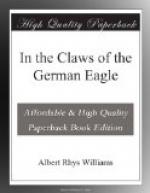Some of the men were moaning as they marched along, but most of them were taking it with the tragic oxlike resignation of the peasant, stupefied more than terrified, puzzled why these soldiers were coming down into their quiet little villages to fight out their quarrels. The women were crying out to Mary and all the saints. Indeed all the little crosses along the waysides or in the walls were decked with flowers in gratitude for what had been spared them. In most cases it was little more than their lives, their brood of children, and their dogs that followed on.
My driver finally landed me in a shack on the outskirts of Eysden, which boasted the name of a hotel. It had the worst bed I ever slept in, and the only window was a hole in the roof.
I wandered out among the unfortunates, now herded in halls and schools and packed in the homes of the friendly villagers. They were full of the weirdest tales of loot and murder. And while there were no tears in their eyes there was tragedy in their voices.
“It would be worth while getting over to the sources and verifying the truth of these stories,” I remarked.
“A sheer impossibility, and only a fool would want to go,” was one laconic commentary.
I kept up my plaint and was overheard by Souten, head of the Limbourg police.
“American, aren’t you?” he interjected. “Well, I have done more work here in the last five days than I did in the five years that I lived in New York. Had the best time in my life there. If you want to go sight-seeing in Belgium, take this paper and get it countersigned at the German consulate. It’s the only one I’ve given out to-day.”
I hurried off to the consul who, in return for six marks, duly impressed it with the German seal. Later on I would gladly have given six hundred marks to disown it.
“Of course you understand that this is simply a paper issued by the civil authorities,” said the consul, as he passed it out. “Use it at your own risk. If you go ahead and get shot by the military authorities, don’t come back and blame us.”
I promised that I wouldn’t and was off again to my hotel.
As darkness deepened, with two Hollanders come to view the havoc of war, I sat on the stoop of our little inn. A great rumbling of cannon came from the direction of Tongres. A sentry shot rang out on the frontier just across the river which flowed not ten rods away. This was the Meuse, which ran red with the blood of the combatants, and from which the natives drew the floating corpses to the shore. Now its gentle lapping on the stones mingled with the subdued murmur of our talk. In such surroundings my new friends regaled me with stories of pillage and murder which the refugees had been bringing in from across the border. All this produced a distinct depreciation in the value that I had hitherto attached to my permit to go visiting across that border. Souten’s declarations of friendship for America had been most voluble. It began dawning on me that his apparently generous and impulsive action might bear a different interpretation than unadulterated kindness.




